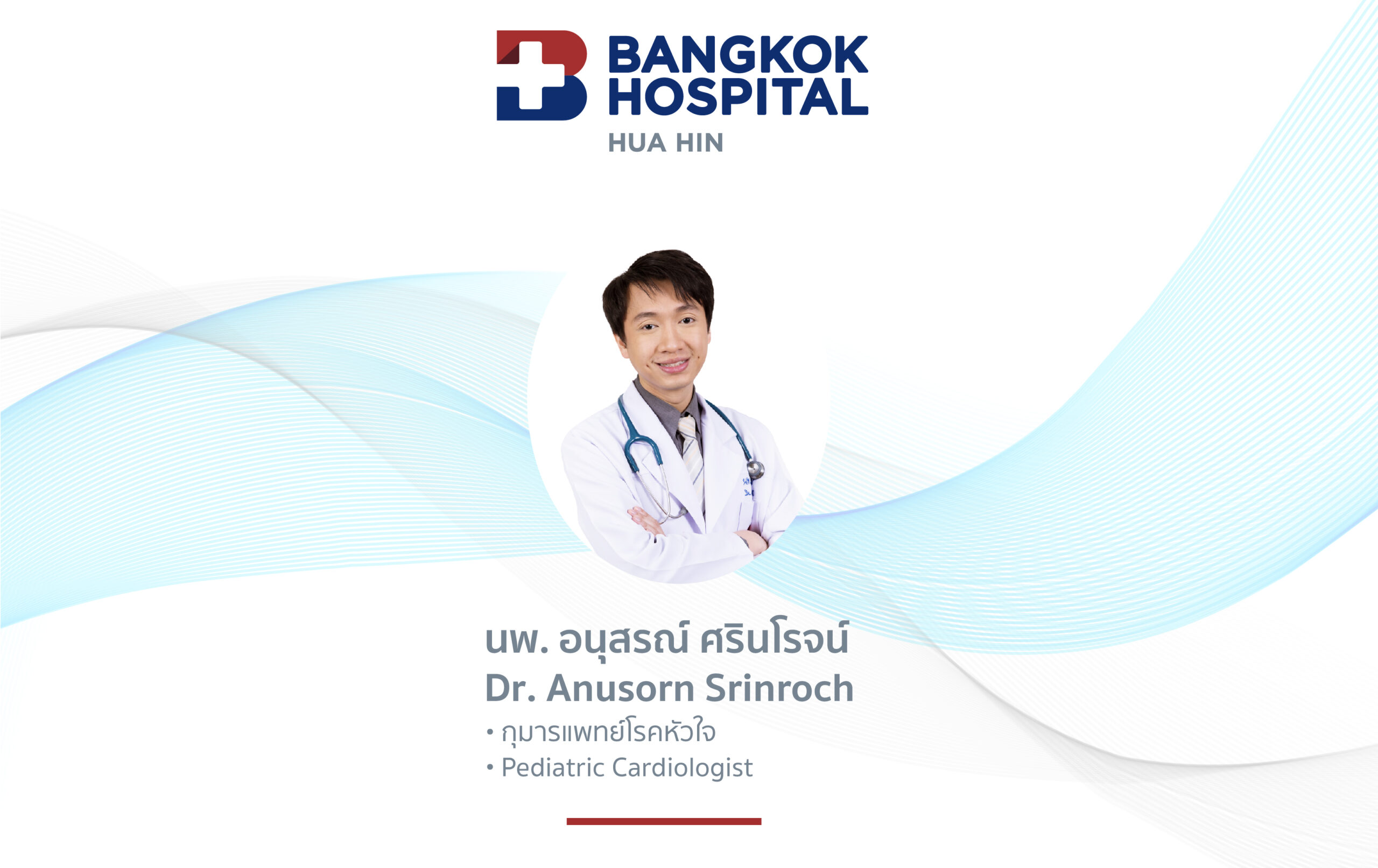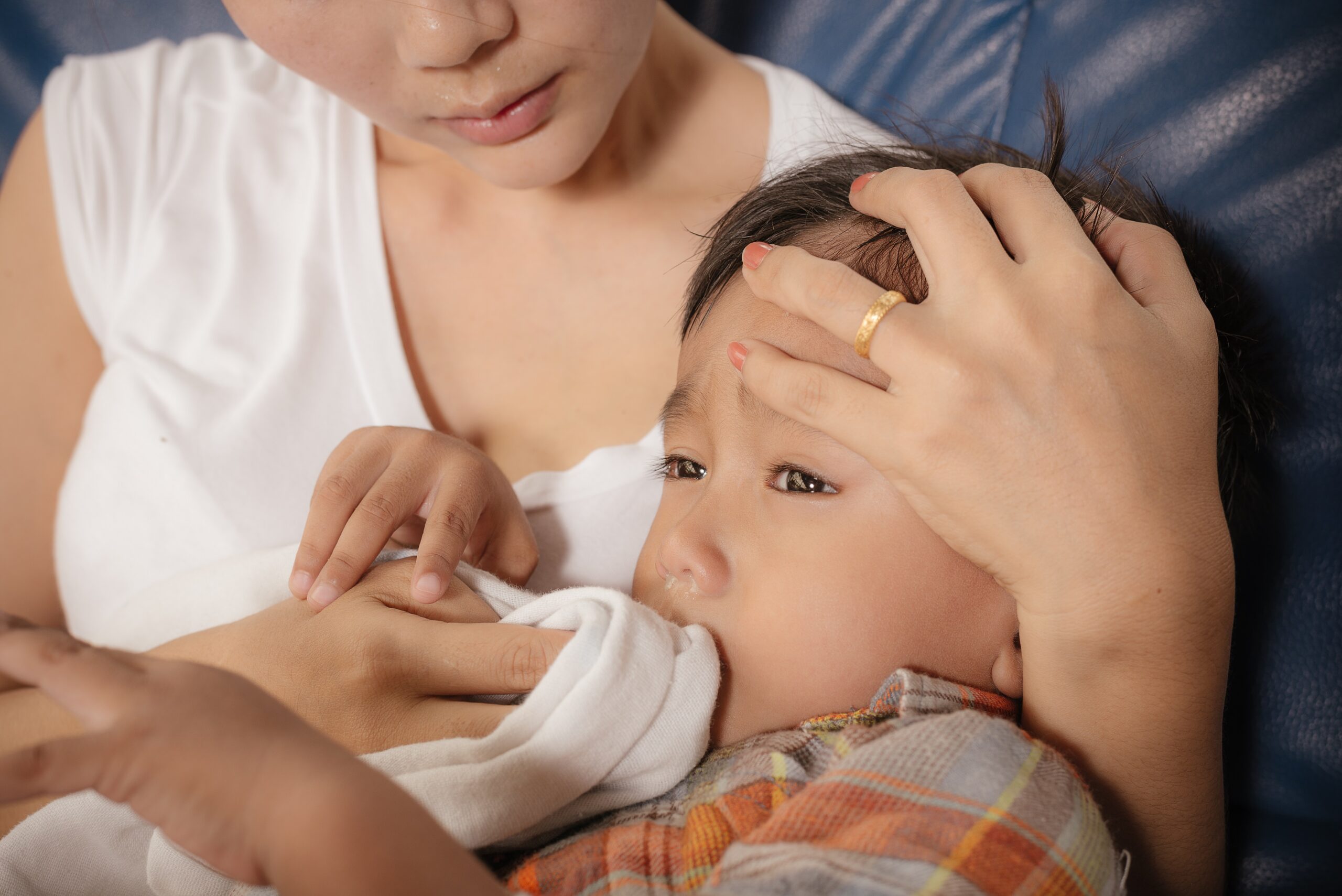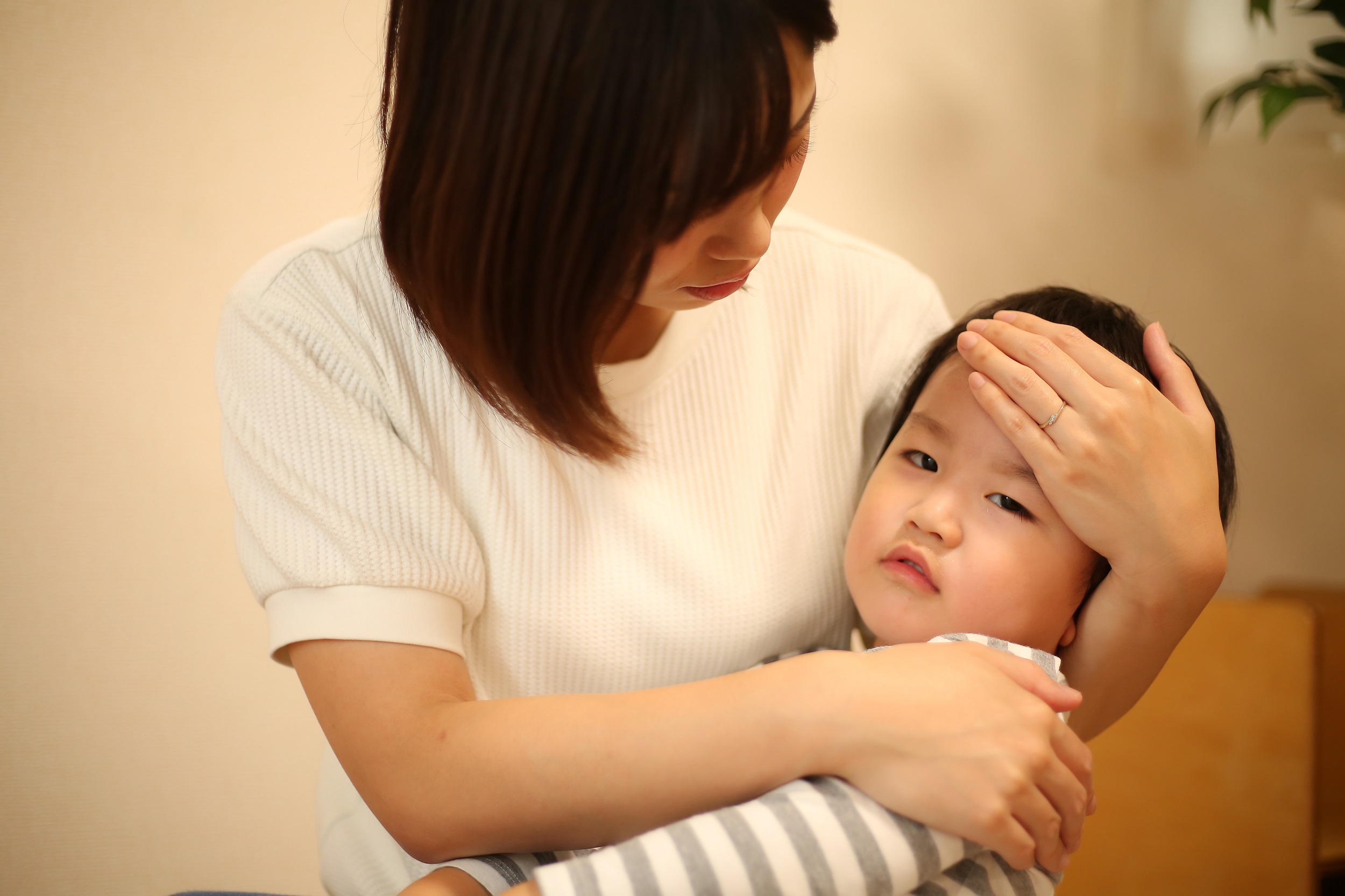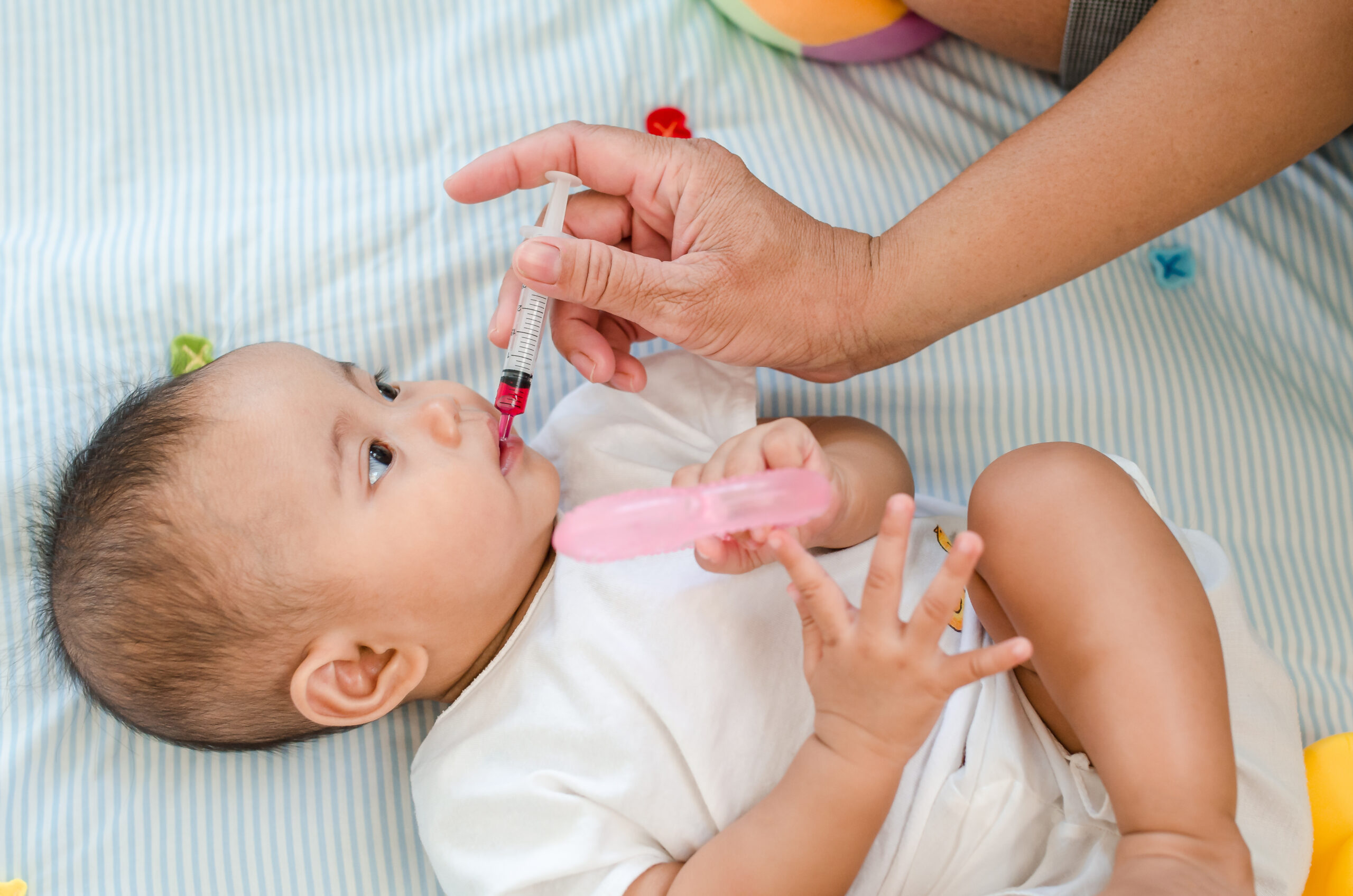The common cold in children is unpredictable
The common cold is a frequent illness in children that is easily caught and usually gets better on its own. However, it’s essential for parents to give close attention to their children when they have a cold. If severe symptoms or complications are present or suspected, it’s best to take the child to a doctor for timely treatment.
Dr. Anusorn Srinroch, our pediatric cardiologist at Bangkok Hospital Hua Hin, explains that the common cold in children is usually caused by various groups of more than 200 types of viruses, with bacterial infections being less common. Bacterial infections often occur as secondary infections after a viral infection.
 How the Common Cold Spreads
The common cold can spread from 8 to 12 hours before symptoms appear until the symptoms go away. It spreads through direct contact with nasal discharge, saliva, coughing, sneezing, and touching contaminated surfaces. Sharing utensils or personal belongings with an infected person can also lead to transmission.
Symptoms
Most of common cold patients recover by themselves, however, children may experience more severe symptoms compared to adults. Symptoms usually appear 1-2 days after infection, peak within 2-3 days, and gradually subside within 5-7 days. Common symptoms include body aches, irritability, and loss of appetite. Nasal infection can lead to inflammation and redness of the nasal mucosa, with clear nasal discharge that may become thick and cloudy. Bacterial infections can cause yellow or green nasal discharge, making breathing difficult. Infection in the throat can lead to coughing, a sore and red throat, discomfort, and phlegm. Complications can occur if the infection spreads to other areas like the ears, sinuses, or lungs.
How the Common Cold Spreads
The common cold can spread from 8 to 12 hours before symptoms appear until the symptoms go away. It spreads through direct contact with nasal discharge, saliva, coughing, sneezing, and touching contaminated surfaces. Sharing utensils or personal belongings with an infected person can also lead to transmission.
Symptoms
Most of common cold patients recover by themselves, however, children may experience more severe symptoms compared to adults. Symptoms usually appear 1-2 days after infection, peak within 2-3 days, and gradually subside within 5-7 days. Common symptoms include body aches, irritability, and loss of appetite. Nasal infection can lead to inflammation and redness of the nasal mucosa, with clear nasal discharge that may become thick and cloudy. Bacterial infections can cause yellow or green nasal discharge, making breathing difficult. Infection in the throat can lead to coughing, a sore and red throat, discomfort, and phlegm. Complications can occur if the infection spreads to other areas like the ears, sinuses, or lungs.
 Complications of the Common Cold
Possible complications include middle ear inflammation, sinusitis, conjunctivitis, bronchitis, laryngitis, pneumonia, and bronchial constriction leading to excessive coughing or breathing difficulties. High fever may also cause seizures, and there is a risk of encephalitis, which can be life-threatening. In some cases, fever may be caused by conditions like systemic lupus erythematosus or Kawasaki disease, which require further medical examination and specific treatments such as specific blood tests and echocardiography to see problems of coronary arteries. The specific treatments are necessary within 10 days to prevent severe heart complications.
Complications of the Common Cold
Possible complications include middle ear inflammation, sinusitis, conjunctivitis, bronchitis, laryngitis, pneumonia, and bronchial constriction leading to excessive coughing or breathing difficulties. High fever may also cause seizures, and there is a risk of encephalitis, which can be life-threatening. In some cases, fever may be caused by conditions like systemic lupus erythematosus or Kawasaki disease, which require further medical examination and specific treatments such as specific blood tests and echocardiography to see problems of coronary arteries. The specific treatments are necessary within 10 days to prevent severe heart complications.
 Treating the Common Cold in Children
The main focus of management is symptomatic care, including fever reduction and ensuring the child stays warm. It’s important for children to drink enough water to prevent dehydration and keep mucus from becoming thick. For nasal and throat congestion, normal saline drops (5-10 drops) can be used to clear the nose with a bulb syringe. Avoiding smoke and cold air is also crucial to prevent increased coughing and breathing difficulties.
Parents should consult a physician for appropriate drug treatment and education regarding possible side effects and contraindications, which may include antipyretics, cough suppressants, expectorants, bronchodilators, and decongestants which may thicken the mucus if not properly used. Antibacterial agents are prescribed when bacterial infection is suspected, but self-administering antimicrobials is not recommended as it may not be beneficial and can lead to diarrhea and future resistance.
Treating the Common Cold in Children
The main focus of management is symptomatic care, including fever reduction and ensuring the child stays warm. It’s important for children to drink enough water to prevent dehydration and keep mucus from becoming thick. For nasal and throat congestion, normal saline drops (5-10 drops) can be used to clear the nose with a bulb syringe. Avoiding smoke and cold air is also crucial to prevent increased coughing and breathing difficulties.
Parents should consult a physician for appropriate drug treatment and education regarding possible side effects and contraindications, which may include antipyretics, cough suppressants, expectorants, bronchodilators, and decongestants which may thicken the mucus if not properly used. Antibacterial agents are prescribed when bacterial infection is suspected, but self-administering antimicrobials is not recommended as it may not be beneficial and can lead to diarrhea and future resistance.
 “If a child experiences difficulty breathing, severe respiratory distress, persistent fever, extreme lethargy, refusal to eat or drink, decreased activity, or if there is suspicion of complications, it’s crucial to seek medical attention promptly. The Respiratory Syncytial Virus (RSV), which tends to affect children under 3 years of age, can also cause similar symptoms to a common cold but should not be underestimated as it can be life-threatening.
In conclusion, parents should provide close care for their children and promptly seek medical attention if necessary. This ensures a proper diagnosis and safe treatment for the common cold and potential complications. Dr. Anusorn Srinroch concludes.”
“If a child experiences difficulty breathing, severe respiratory distress, persistent fever, extreme lethargy, refusal to eat or drink, decreased activity, or if there is suspicion of complications, it’s crucial to seek medical attention promptly. The Respiratory Syncytial Virus (RSV), which tends to affect children under 3 years of age, can also cause similar symptoms to a common cold but should not be underestimated as it can be life-threatening.
In conclusion, parents should provide close care for their children and promptly seek medical attention if necessary. This ensures a proper diagnosis and safe treatment for the common cold and potential complications. Dr. Anusorn Srinroch concludes.”
 **************************************************************************
For more information and booking an appointment, please contact :
Tel. 032-616-800 Call Center, Bangkok Hospital Hua Hin
Tel. 032-616-883 Pediatric Department (8.00 – 17.00 hrs.)
News & Promotion >> Line ID : @bangkokhuahin
**************************************************************************
For more information and booking an appointment, please contact :
Tel. 032-616-800 Call Center, Bangkok Hospital Hua Hin
Tel. 032-616-883 Pediatric Department (8.00 – 17.00 hrs.)
News & Promotion >> Line ID : @bangkokhuahin
 How the Common Cold Spreads
The common cold can spread from 8 to 12 hours before symptoms appear until the symptoms go away. It spreads through direct contact with nasal discharge, saliva, coughing, sneezing, and touching contaminated surfaces. Sharing utensils or personal belongings with an infected person can also lead to transmission.
Symptoms
Most of common cold patients recover by themselves, however, children may experience more severe symptoms compared to adults. Symptoms usually appear 1-2 days after infection, peak within 2-3 days, and gradually subside within 5-7 days. Common symptoms include body aches, irritability, and loss of appetite. Nasal infection can lead to inflammation and redness of the nasal mucosa, with clear nasal discharge that may become thick and cloudy. Bacterial infections can cause yellow or green nasal discharge, making breathing difficult. Infection in the throat can lead to coughing, a sore and red throat, discomfort, and phlegm. Complications can occur if the infection spreads to other areas like the ears, sinuses, or lungs.
How the Common Cold Spreads
The common cold can spread from 8 to 12 hours before symptoms appear until the symptoms go away. It spreads through direct contact with nasal discharge, saliva, coughing, sneezing, and touching contaminated surfaces. Sharing utensils or personal belongings with an infected person can also lead to transmission.
Symptoms
Most of common cold patients recover by themselves, however, children may experience more severe symptoms compared to adults. Symptoms usually appear 1-2 days after infection, peak within 2-3 days, and gradually subside within 5-7 days. Common symptoms include body aches, irritability, and loss of appetite. Nasal infection can lead to inflammation and redness of the nasal mucosa, with clear nasal discharge that may become thick and cloudy. Bacterial infections can cause yellow or green nasal discharge, making breathing difficult. Infection in the throat can lead to coughing, a sore and red throat, discomfort, and phlegm. Complications can occur if the infection spreads to other areas like the ears, sinuses, or lungs.
 Complications of the Common Cold
Possible complications include middle ear inflammation, sinusitis, conjunctivitis, bronchitis, laryngitis, pneumonia, and bronchial constriction leading to excessive coughing or breathing difficulties. High fever may also cause seizures, and there is a risk of encephalitis, which can be life-threatening. In some cases, fever may be caused by conditions like systemic lupus erythematosus or Kawasaki disease, which require further medical examination and specific treatments such as specific blood tests and echocardiography to see problems of coronary arteries. The specific treatments are necessary within 10 days to prevent severe heart complications.
Complications of the Common Cold
Possible complications include middle ear inflammation, sinusitis, conjunctivitis, bronchitis, laryngitis, pneumonia, and bronchial constriction leading to excessive coughing or breathing difficulties. High fever may also cause seizures, and there is a risk of encephalitis, which can be life-threatening. In some cases, fever may be caused by conditions like systemic lupus erythematosus or Kawasaki disease, which require further medical examination and specific treatments such as specific blood tests and echocardiography to see problems of coronary arteries. The specific treatments are necessary within 10 days to prevent severe heart complications.
 Treating the Common Cold in Children
The main focus of management is symptomatic care, including fever reduction and ensuring the child stays warm. It’s important for children to drink enough water to prevent dehydration and keep mucus from becoming thick. For nasal and throat congestion, normal saline drops (5-10 drops) can be used to clear the nose with a bulb syringe. Avoiding smoke and cold air is also crucial to prevent increased coughing and breathing difficulties.
Parents should consult a physician for appropriate drug treatment and education regarding possible side effects and contraindications, which may include antipyretics, cough suppressants, expectorants, bronchodilators, and decongestants which may thicken the mucus if not properly used. Antibacterial agents are prescribed when bacterial infection is suspected, but self-administering antimicrobials is not recommended as it may not be beneficial and can lead to diarrhea and future resistance.
Treating the Common Cold in Children
The main focus of management is symptomatic care, including fever reduction and ensuring the child stays warm. It’s important for children to drink enough water to prevent dehydration and keep mucus from becoming thick. For nasal and throat congestion, normal saline drops (5-10 drops) can be used to clear the nose with a bulb syringe. Avoiding smoke and cold air is also crucial to prevent increased coughing and breathing difficulties.
Parents should consult a physician for appropriate drug treatment and education regarding possible side effects and contraindications, which may include antipyretics, cough suppressants, expectorants, bronchodilators, and decongestants which may thicken the mucus if not properly used. Antibacterial agents are prescribed when bacterial infection is suspected, but self-administering antimicrobials is not recommended as it may not be beneficial and can lead to diarrhea and future resistance.
 “If a child experiences difficulty breathing, severe respiratory distress, persistent fever, extreme lethargy, refusal to eat or drink, decreased activity, or if there is suspicion of complications, it’s crucial to seek medical attention promptly. The Respiratory Syncytial Virus (RSV), which tends to affect children under 3 years of age, can also cause similar symptoms to a common cold but should not be underestimated as it can be life-threatening.
In conclusion, parents should provide close care for their children and promptly seek medical attention if necessary. This ensures a proper diagnosis and safe treatment for the common cold and potential complications. Dr. Anusorn Srinroch concludes.”
“If a child experiences difficulty breathing, severe respiratory distress, persistent fever, extreme lethargy, refusal to eat or drink, decreased activity, or if there is suspicion of complications, it’s crucial to seek medical attention promptly. The Respiratory Syncytial Virus (RSV), which tends to affect children under 3 years of age, can also cause similar symptoms to a common cold but should not be underestimated as it can be life-threatening.
In conclusion, parents should provide close care for their children and promptly seek medical attention if necessary. This ensures a proper diagnosis and safe treatment for the common cold and potential complications. Dr. Anusorn Srinroch concludes.”
 **************************************************************************
For more information and booking an appointment, please contact :
Tel. 032-616-800 Call Center, Bangkok Hospital Hua Hin
Tel. 032-616-883 Pediatric Department (8.00 – 17.00 hrs.)
News & Promotion >> Line ID : @bangkokhuahin
**************************************************************************
For more information and booking an appointment, please contact :
Tel. 032-616-800 Call Center, Bangkok Hospital Hua Hin
Tel. 032-616-883 Pediatric Department (8.00 – 17.00 hrs.)
News & Promotion >> Line ID : @bangkokhuahin